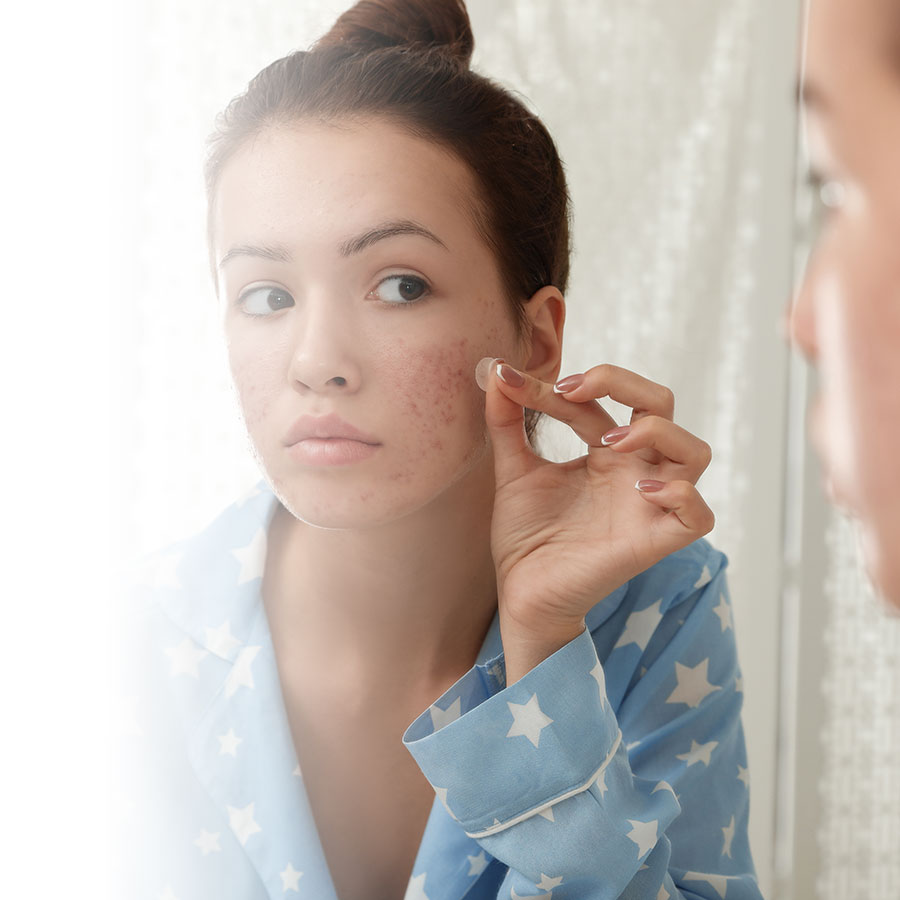- Do not wear a cap or hat if acne is located on the forehead. The friction of fabric on the skin can promote acne.
- If you use hair gel or hairspray, be careful not to apply it to your face, as these products can clog pores.
- If your hair touches your face, be sure to wash it frequently to remove any oil and dirt residue.
- If you wear glasses, clean them frequently to prevent acne near the area around your nose.
- Avoid touching your face with your hands. There is oil, dirt and bacteria on your fingers that can promote the onset of infected pimples
- Avoid touching lesions, blackheads and pimples, as this can cause inflammation and scarring.
Do you suffer from acne? There are solutions. Proper hygiene and products adapted to your skin type can help you get rid of it.
What is acne?
Acne appears as blackheads (called comedones) or whiteheads, pimples (called pustules) or cysts (filled with pus). The face, neck, shoulders, back and chest are the areas most often affected by it.
Today, social pressure to look good is very intense and acne is often perceived as unpleasant because of its unsightly nature. It is a widespread health issue, affecting up to 85% of teenagers and 11% of adults. It is easy to underestimate its impact. Yet, acne can have repercussions on many levels: self-esteem, well-being, intimate or social relationships, etc.
What causes acne?
The main cause of acne is a hypersecretion (excessive production) of sebum, a fatty substance secreted by the sebaceous glands whose role is to protect the skin from drying out. Excess sebum accumulates on the surface of the skin and makes it oilier, causing the skin's pores to become clogged. This promotes the growth of bacteria and the appearance of acne.
This hypersecretion of sebum is mainly caused by a hormonal imbalance during puberty or the menstrual cycle. Other factors that can promote acne include:
- taking certain medications
- the presence of grease and dust at school or in the workplace
- excessive friction of the skin
- lack of skin hydration
- poor hygiene
- picking at lesions
- having hair near or touching the face
- using oil-based cosmetics
- heredity
- etc.

How can acne be prevented?
Here are some recommendations to prevent and reduce the progression of acne:
- Wash your face regularly, in the morning and evening, with a cleanser (free of soap) designed for acne-prone skin to prevent the accumulation of sebum and oil.
- Thoroughly remove makeup.
- Use non-comedogenic creams and makeup that won't clog the skin's pores.
- Ideally, men should use an electric shaver. If you prefer razor blades, shave in the shower when skin is well hydrated and soft. Use foam and shave in the direction of the hair.

Can acne be treated?
If you suffer from mild acne, there are several cleansers and treatments that can help eliminate the problem. Most over-the-counter products contain benzoyl peroxide or salicylic acid. These medications have an exfoliating action, which means that they remove dead skin and prevent the growth of bacteria. Therefore, they are effective in treating acne where there are blackheads or whiteheads, but no inflammation or cysts.
In most cases, you will notice a significant improvement only a few days or weeks after starting the treatment. To get the most out of your medication, be sure to read the manufacturer's instructions before using it.
In general, juvenile acne (in teenagers) is relatively easy to treat. Unfortunately, adult acne is sometimes more difficult to treat. Some products are specifically designed for the needs of adult skin.
If you are experiencing severe symptoms of acne, then it is recommended that you seek medical attention. In your case, prescription treatment may be indicated. Don't ignore treatment as it can prevent long-term consequences such as permanent scarring.
In Quebec, if you have had a topical treatment prescribed to you by a doctor in the last five years and the prescription is no longer renewable, ask your pharmacist if they can re-prescribe it. To do so, they must conduct a consultation with you to assess your situation and determine whether or not they can prescribe the treatment. If you live outside of Quebec, your pharmacist may also be able to recommend and even prescribe a treatment. Never hesitate to consult your pharmacist.
Don’t hesitate to consult your pharmacist for additional information about acne and its treatments.

